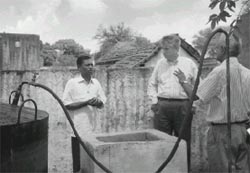Rising like the Phoenix
 floods sweep through the village, the land is left uncultivable, the wells get filled with pebbles and mud. Agriculture becomes impossible. A cry of despair and despondency from the unfortunate residents would be a common sequel to this. Not in the villages of the Chaksu Block of Jaipur, Rajasthan. Thanks to the work of the Kumarappa Institute of Gram Swaraj ( kigs) .
floods sweep through the village, the land is left uncultivable, the wells get filled with pebbles and mud. Agriculture becomes impossible. A cry of despair and despondency from the unfortunate residents would be a common sequel to this. Not in the villages of the Chaksu Block of Jaipur, Rajasthan. Thanks to the work of the Kumarappa Institute of Gram Swaraj ( kigs) .
The institute is named after the Gandhian economist, Joseph Cornelius Kumarappa. Established in 1967, it believes the village to be the "the basic unit of achieving the target of economics of peace and change in the social setup'. Inspired by Mahatma Gandhi and Acharya Vinoba Bhave, it has used the system of g ramdan whereby people voluntarily transfer property rights to the village assembly and manage their resources collectively.
kigs chose to work in gramdan villages such as Badh Mahawatan, Lakhawas, Beed Sanstoshpura and Naharwal Dhani in the Chaksu block.
Having elicited views from the villagers regarding what their priorities were, kigs began with watershed management in the area, constructing tanks, contour bunding and deepening of wells. As sufficient land was not available, enough ponds could not be built. "We did merbundi (contour bunding) and built anicuts. With this the water was prevented from flowing out and the fields regained their regenerative capacity. The water table level rose,' explains Awadh Prasad from kigs .
The fields were levelled. The farmers were made aware of the benefits of organic farming and they readily converted to it. But the crop yield came down. Overuse of fertilisers had altered the soil character. The soil had become dependent on external supplements. A changeover to organic farming lead to deficiency in this external aid to the soil.
But, with time, the soil regained its regenerative abilities. Now, organic farming is bringing the soil back to its fertile best.
kigs also advised planting green vegetables. It helped. One, the families got a nutritious diet. Two, they were able to sell the surplus and earn additional income. The holistic approach to development is evident. "We told them that
